Educational trip of the Ukrainian delegation to Marburg (Germany)
(11-14 September 2017)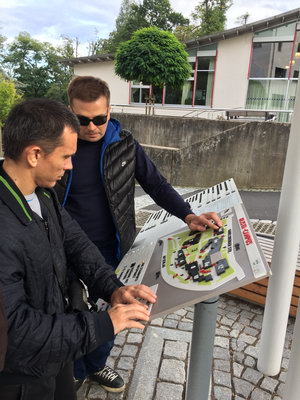
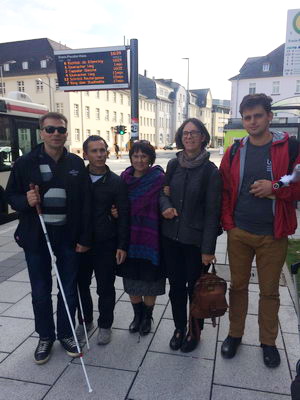
In September 2017 within the project “Raising of chances for getting education for young people with disorders of sight” 5 representatives of non-governmental organization visited Marburg. The project has been realized under the support of Ministry of Foreign Affairs of Germany and the International Educational Centre, Dortmund.
The main objective of the trip is to study the German experience of supporting people with severe disorder of sight on the example of Blista Resource Centre. Blista is the German modern resource-educational center of more than 100 years of experience providing educational and rehabilitation services to people with severe sight disorders. The center combines a school, a basic gymnasium, a media center, a library, a Braille script printing office, a center for preparing the tutorials and graphics for blind and visually impaired people, a rehabilitation center and an early-care center for children and parents, a sports complex and many other things. “We are convinced that at the training seminars in Marburg our Ukrainian partners will receive an important impulse for the further development of the concept of a media center in Kharkiv, created to accompany students with sight disorders”, says Dr. Astrid Sahm, the director of IBB Dortmund.
Marburg impressed the Ukrainian delegation immediately after arriving at the town, which is at most adapted to blind people. For example, the stair railings at the train station have signs in Braille, indicating the track and platform. The plan for the location of Blista’s Centre has a description in Braille that greatly facilitates the orientation for blind and disorder sighted people. Some of the sights of the city are presented in miniature models, which can be seen with hands as well.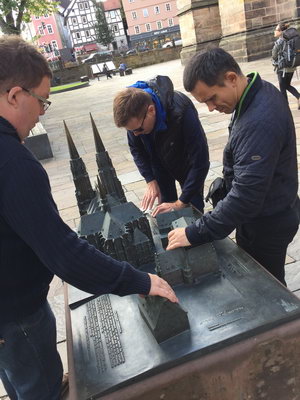
“Marburg is an incredible, extremely friendly town for people with sight disorders. We are pleased much that the important information available in the arsenal of centuries-old experience of Blista center has been shared with us”, - said the head of Chernobyl 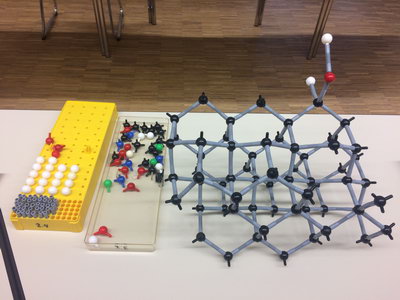 History Workshop Ljubov Negatina. Serhiy Prokopenko, the founder of Gwara Media, the initiator of several inclusive media projects in Kharkiv, told that he had never seen so many people with white canes in one place moving freely without any help.
History Workshop Ljubov Negatina. Serhiy Prokopenko, the founder of Gwara Media, the initiator of several inclusive media projects in Kharkiv, told that he had never seen so many people with white canes in one place moving freely without any help.
How to distinguish a circle from a rhombus? What is common between the sinus and the staircase lined against the wall? How to determine an angle between two straight lines? How does flower pollination occur? The participants in the project took part in the inclusive Maths, Physics and sports classes at Blista Centre, where complex processes are explained with the help of specially developed programs and tactile attachments, three-dimensional and relief models. The Ukrainian delegation also visited the media centre, the consultative rehabilitation centre and the library for blind people, which has about 40,000 audiobooks and 10,000 books in Braille.
The members of the delegation were delighted with the information and training materials presented at Blista Centre. «The approach to the education of blind children here is very interesting and unusual for us to some extent. But the atmosphere is very good, the conditions, created for training are excellent" said Andrey Butenko, the director of the social enterprise “SotsIntel” Volodymyr Noskov, a member of 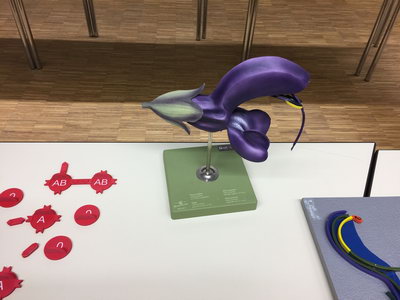 the Association of Journalists of Ukraine and an employee of “Radio Liberty”, told that he was impressed mostly by the proposals for professional rehabilitation in the center of Blista. The blind learners, as well as people who have lost sight at an early age are offered among other things, to study for IT specialist. It is gainful for IT companies, the state and the blind
the Association of Journalists of Ukraine and an employee of “Radio Liberty”, told that he was impressed mostly by the proposals for professional rehabilitation in the center of Blista. The blind learners, as well as people who have lost sight at an early age are offered among other things, to study for IT specialist. It is gainful for IT companies, the state and the blind 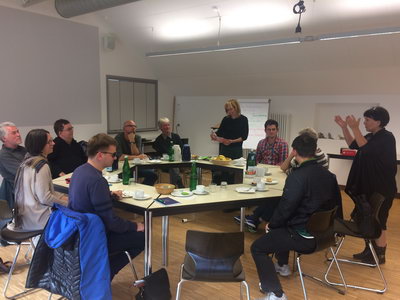 people”.
people”.
At the end of the educational trip, a round table was held, during which it was discussed the changes in the last 40 years in the approach to rehabilitation and training of people with severe disorders of sight, the transformation of special educational institutions, inclusions, as well as the question of what achievements seen at Blista Centre can be applied in Ukraine.




















